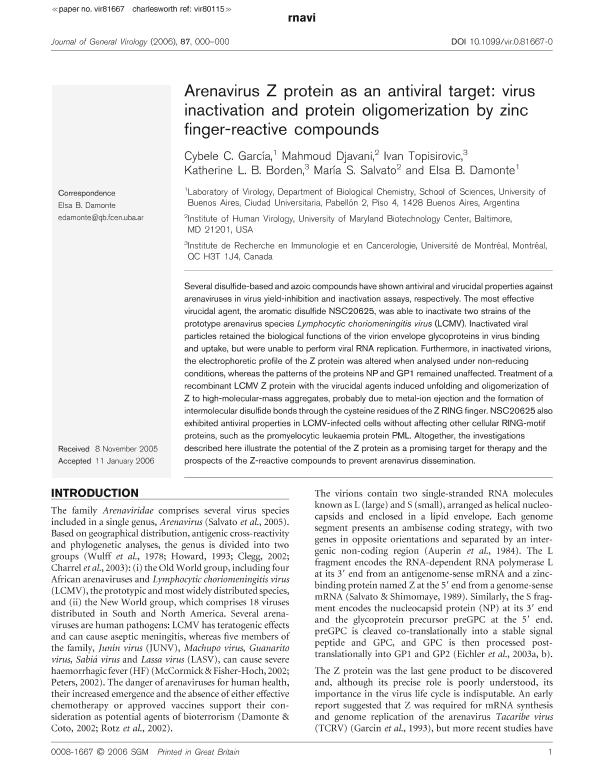Mostrar el registro sencillo del ítem
dc.contributor.author
Garcia, Cybele

dc.contributor.author
Djavani, Mahmoud
dc.contributor.author
Topisirovic, Ivan
dc.contributor.author
Borden, Katherine L. B.
dc.contributor.author
Salvato, María S.
dc.contributor.author
Damonte, Elsa Beatriz

dc.date.available
2020-04-14T01:41:33Z
dc.date.issued
2006-05
dc.identifier.citation
Garcia, Cybele; Djavani, Mahmoud; Topisirovic, Ivan; Borden, Katherine L. B.; Salvato, María S.; et al.; Arenavirus Z protein as an antiviral target: virus inactivation and protein oligomerization by zinc finger-reactive compounds; Society for General Microbiology; Journal of General Virology; 87; 5; 5-2006; 1217-1228
dc.identifier.issn
0022-1317
dc.identifier.uri
http://hdl.handle.net/11336/102417
dc.description.abstract
Several disulfide-based and azoic compounds have shown antiviral and virucidal properties against arenaviruses in virus yield-inhibition and inactivation assays, respectively. The most effective virucidal agent, the aromatic disulfide NSC20625, was able to inactivate two strains of the prototype arenavirus species Lymphocytic choriomeningitis virus (LCMV). Inactivated viral particles retained the biological functions of the virion envelope glycoproteins in virus binding and uptake, but were unable to perform viral RNA replication. Furthermore, in inactivated virions, the electrophoretic profile of the Z protein was altered when analysed under non-reducing conditions, whereas the patterns of the proteins NP and GP1 remained unaffected. Treatment of a recombinant LCMV Z protein with the virucidal agents induced unfolding and oligomerization of Z to high-molecular-mass aggregates, probably due to metal-ion ejection and the formation of intermolecular disulfide bonds through the cysteine residues of the Z RING finger. NSC20625 also exhibited antiviral properties in LCMV-infected cells without affecting other cellular RING-motif proteins, such as the promyelocytic leukaemia protein PML. Altogether, the investigations described here illustrate the potential of the Z protein as a promising target for therapy and the prospects of the Z-reactive compounds to prevent arenavirus dissemination.
dc.format
application/pdf
dc.language.iso
eng
dc.publisher
Society for General Microbiology

dc.rights
info:eu-repo/semantics/openAccess
dc.rights.uri
https://creativecommons.org/licenses/by-nc-sa/2.5/ar/
dc.subject
antiviral
dc.subject
arenavirus
dc.subject
inactivation
dc.subject
Z protein
dc.subject.classification
Virología

dc.subject.classification
Ciencias Biológicas

dc.subject.classification
CIENCIAS NATURALES Y EXACTAS

dc.title
Arenavirus Z protein as an antiviral target: virus inactivation and protein oligomerization by zinc finger-reactive compounds
dc.type
info:eu-repo/semantics/article
dc.type
info:ar-repo/semantics/artículo
dc.type
info:eu-repo/semantics/publishedVersion
dc.date.updated
2019-11-25T19:07:28Z
dc.journal.volume
87
dc.journal.number
5
dc.journal.pagination
1217-1228
dc.journal.pais
Reino Unido

dc.journal.ciudad
London
dc.description.fil
Fil: Garcia, Cybele. Consejo Nacional de Investigaciones Científicas y Técnicas; Argentina. Universidad de Buenos Aires. Facultad de Ciencias Exactas y Naturales. Departamento de Química Biológica. Laboratorio de Virología; Argentina
dc.description.fil
Fil: Djavani, Mahmoud. University of Maryland Biotechnology Center; Estados Unidos
dc.description.fil
Fil: Topisirovic, Ivan. University of Montreal; Canadá
dc.description.fil
Fil: Borden, Katherine L. B.. University of Montreal; Canadá
dc.description.fil
Fil: Salvato, María S.. University of Maryland Biotechnology Center; Estados Unidos
dc.description.fil
Fil: Damonte, Elsa Beatriz. Universidad de Buenos Aires. Facultad de Ciencias Exactas y Naturales. Departamento de Química Biológica. Laboratorio de Virología; Argentina. Consejo Nacional de Investigaciones Científicas y Técnicas; Argentina
dc.journal.title
Journal of General Virology

dc.relation.alternativeid
info:eu-repo/semantics/altIdentifier/doi/https://doi.org/10.1099/vir.0.81667-0
dc.relation.alternativeid
info:eu-repo/semantics/altIdentifier/url/https://www.microbiologyresearch.org/content/journal/jgv/10.1099/vir.0.81667-0
Archivos asociados
